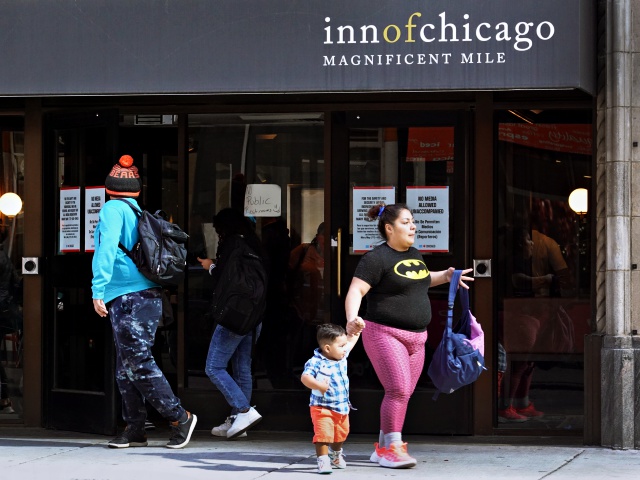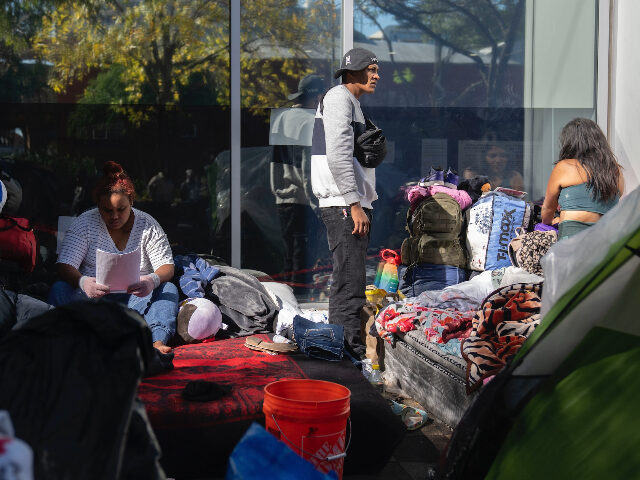Two Chicago suburbs have enacted steep $1,000-per-month taxes on hotels in an effort to stop plans by the state of Illinois to use the facilities for long-term migrant housing.
The latest city to enact this harsh tax is northwest suburban Schaumburg, which implemented the tax for those staying longer than 30 days after hearing that state officials were looking at three hotels in the city to use for long-term housing for illegal aliens, the Daily Herald reported.
The general procedure in the past has been for the state to contract directly with hotel operators without involving local government officials.
The first city to enact such a tax — aimed to convince hotels not to engage in such contracts — was Rosemont, a town with a long strip of hotels that usually caters to the convention business. The hotels surround the Donald E. Stephens Convention Center, an 840,000 sq. ft. facility that hosts a wide array of events.
Rosemont is also right at the eastern edge of O’Hare International Airport, and many of the hotels in the city cater to travelers out of one of the world’s busiest hubs.
Rosemont Mayor Brad Stephens, though, was alarmed by plans being floated by Chicago developer Mike Reschke, who was hoping to pull in up to eight hotels in the area to host thousands of illegals.
Like Mayor Stephens, Schaumburg Mayor Tom Dailly was alarmed by the plans for the region’s hotels. “The goal here is to protect our hotels,” he recently said.
Still, Schaumburg Village Manager Brian Townsend pointed out that there are already migrants in his town, and they have settled in just fine. And he insisted that the steep hotel tax is not an effort to keep migrants away from Schaumburg.
“We want to make sure it’s done in a planned and responsible way,” Townsend explained. “We’ve developed a solution we think works.”
Both cities added provisions that residents affected by house fires or other disasters or corporate employees living in the area for an extended but not permanent period would be exempt from triggering the tax.
Schaumburg and Rosemont apparently hope to avoid the experience of Burr Ridge Mayor Gary Grasso, who, in September 2022, discovered that the city of Chicago had dropped off dozens of illegals at the Burr Ridge hotel after the hotel agreed to house migrants. The housing plan, though, was a total surprise to Grasso and his city council, neither of which were informed of the plan ahead of time.
The two towns are also likely wary of the idea of housing migrants in hotels, especially after the many problems seen at similar facilities in Chicago.
WATCH: Immigrants Make Camp, Scatter Belongings and Trash in Police Stations Around Chicago
Rebecca Brannon, Independent Photojournalist/LOCAL NEWS X /TMXChicago’s 42nd Ward Alderman Brendan Reilly, for instance, became highly concerned after city officials contracted with a hotel in his Ward when the area surrounding the hotel became a locus for criminal behavior, prostitution, drug dealing, litter, and noise complaints.
Reilly wrote a letter to the mayor’s office in July, speaking of the “concerns my office receives daily regarding new arrivals living at the Inn of Chicago.”
Reilly warned that his voters are expressing “concerns about migrants loitering, littering, illegally parking their vehicles, and leaving human waste on the sidewalks near the hotel.”

People walk by the Inn of Chicago, a hotel being used for temporary housing for newly arrived migrants, on May 10, 2023, in Chicago, Illinois. (Scott Olson/Getty Images)
The alderman also noted that residents are reporting that illegals “have been seen selling narcotics and engaging in lewd activity, including possible prostitution” in and around the location.
Residents organized in Chicago’s Hyde Park neighborhood in August when the city quietly arranged to house migrants in the Lake Shore Hotel in the district. The hotel had been used to stockpile dozens of migrants in the past, and residents said that crime, loitering, drugs, litter, and other forms of lawlessness increased immediately upon the arrival of the border crossers.
Follow Warner Todd Huston on Facebook at: facebook.com/Warner.Todd.Huston, or Truth Social @WarnerToddHuston

COMMENTS
Please let us know if you're having issues with commenting.